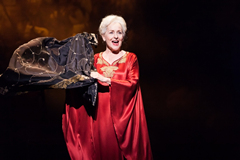| Opera Reviews | 28 April 2024 |
Von Stade nails the coffinby Steve Cohen |
|
| Gordon: A Coffin in Egypt Opera Philadelphia 6 June 2014 |
|
|
The legendary Texas playwright recognized that. For the play’s premiere in 1998 Foote recorded hymns at an African-American church to be used as off-stage sound cues. He envisioned them as background to the reminiscences of a 90-year-old white woman in the rural town of Egypt, Texas, where black people lived nearby but were treated as second-class citizens. Myrtle has outlived her husband, daughters and almost everyone else in Egypt. Now she recalls betrayal, racism, adultery and two murders. She goes through stages of anger and regret as she contemplates the coffin that awaits her. Leonard Foglia was the director of the play’s staging, and his background included special appreciation of drama combined with music. He had directed the 1995 world premiere by Philadelphia Theatre Company of Master Class, Terrence McNally’s play about the soprano Maria Callas. Foglia eventually wrote a libretto for this operatic version of A Coffin in Egypt and Ricky Ian Gordon composed the music. Gordon’s successful works include Only Heaven (1995) set to the poetry of Langston Hughes, Dream True (1999) based on a novel by George du Maurier, and My Life With Albertine (2002) based on Marcel Proust’s "Remembrance Of Things Past". Some of his works are labeled “musicals” and some “operas” yet they share an emphasis on communicative melody. He envisioned a chamber opera with a 13-person instrumental ensemble, similar to some of the operas of Benjamin Britten. But Gordon decided that he wanted to include a gospel quartet who would appear live on stage like a Greek chorus. In order to keep the project within budget, Gordon agreed to swap four instrumentalists for the four gospel singers that he wanted so badly, so he composed the piece for an orchestra of nine. As we saw at the East Coast premiere June 6, those gospel singers provided the backbone of the opera. Their hymns, freshly composed by Gordon, are traditionally harmonic and are tunefully catchy. They comment on the action and on the old lady’s state of mind. For example, the choir sings “Step Back” and Myrtle goes back in time to recount her husband’s affairs. Most upsetting is his love affair with a black woman, despite the Texas law that forbids it. In contrast to the gospel quartet, Myrtle’s music is ethereal and wide-ranging, conjuring imagery of the prairie of her youth. Frederica von Stade is onstage for the opera’s entire 80 minutes, singing most of it and speaking during a few short conversations with people from her past and with her caretaker. This is a tour de force for the 69-year-old mezzo who made her farewell appearance at the Metropolitan Opera in 2001 when many said her leave-taking was premature. Van Stade sang this role with the power of a performer in her prime; listeners had no need to make any allowances for her age. At the same time, she moved with the halting pace of an elderly lady. As a reflection of Myrtle’s years, she repeated many stories about her past and that was turned into a musical asset; it allowed Gordon to repeat melodies and subtly alter them, thus providing continuity and familiarity for the listener. To avoid the possible monotony of long monologs, Gordon supplied plenty of melodic and rhythmic variety in the small orchestra and the gospel quartet. The interplay of five singers and nine instruments should be savored — if you focus exclusively on the soprano’s solo you’ll miss a lot. Gordon’s music is transparent and evanescent, as if the piece is about to disappear, just as the stories in Myrtle’s mind are about to disappear. A simple backdrop suggested the terrain of Texas. David Matranga, Carolyn Johnson, Kate Bianco and Ben Sheaffer were fine in their brief speaking parts. Veronica Chapman-Smith, Julie-Ann Green, Taiwan Norris and Frank Mitchell were the superb gospel singers. Timothy Myers conducted with sensitivity.
|
|
| Text ©
Steve Cohen Photo © Kelly & Massa |

 Horton Foote was a distinguished writer, yet his play, A Coffin in Egypt, needed to be musicalized in order to bloom.
Horton Foote was a distinguished writer, yet his play, A Coffin in Egypt, needed to be musicalized in order to bloom.






